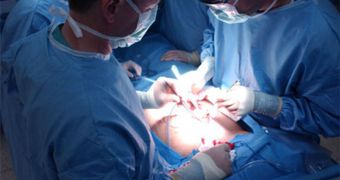One of the most dangerous things about any major surgery is when a doctor inadvertently cuts through a large blood vessel, or when one ruptures. As this happens, the risk of the patient dying on the operating table becomes very large. This is a very dangerous time, and experts doing the surgery must act fast, without delay, to keep the bleeding in check. But, sometimes, they fail, as existing methods of controlling a hemorrhage cannot face all possible scenarios. For this very purpose, investigators at the Carnegie Mellon University are currently working on a new method of stopping excessive blood loss, when it occurs during live operations.
The new hydrosurgery system will hopefully provide physicians with a much more effective tool of staying on top of the situation, potentially reducing the number of lives that are lost to complications. In charge of the development efforts is Carnegie Mellon PhD candidate in biomedical engineering Matt Oberdier, who says that the innovation will come in handy especially for surgeons working on the brain or the heart. Excess blood could become a thing of the past. In practical terms, having less blood flowing over the site of the operation allows the surgeon to get a better view of what he or she is doing.
“We are creating a device that will house a clear, hermetically sealed dome through which instruments may be passed, and a special pump to apply fluid pressure and monitor the flow to the surgical area,” Oberdier says. “About half of all surgeons' time is spent trying to control some level of bleeding during most operations. This new tool will save time and has the potential to benefit more than 35 million patients worldwide,” Carnegie Mellon Biomedical Engineering Department adjunct lecturer James Burgees explains. He is also a neurosurgeon at the Allegheny General Hospital, and Oberdier's co-advisor.
When dealing specifically with brain surgeries, experts sometime need to navigate deep within the skull, and also to avoid or manage very small blood vessels. While these veins and arteries may seem insignificant in size, they carry a huge supply of blood, given that the brain is the best irrigated organ in the human body. Many experts believe that the future of surgery lies not within passing the task to robots, but within developing and perfecting cutting-edge tools for physicians and hospitals.

 14 DAY TRIAL //
14 DAY TRIAL //